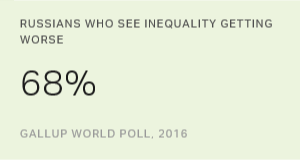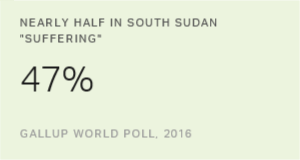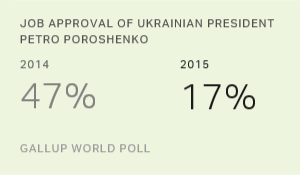Story Highlights
- Half the population (48%) near Ukraine's conflict zone is suffering
- Despite nationwide suffering and poverty, economic optimism rises in West
- Nearly half the population (46%) struggled to afford food in 2016
WASHINGTON, D.C. -- While the conflict no longer dominates headlines, a full cease-fire between Ukrainian and Russian-backed separatist forces remains an elusive goal in Eastern Ukraine, the region that solely accounted for driving the "suffering" percentage in the country to one of the in 2016. The percentage of Ukrainians who rate their current and future lives poorly enough to be considered suffering has remained stable in the rest of the country over the past two years, but it jumped from 36% in 2015 to 48% in 2016 in the South and East, the areas closest to the conflict zone.
| 2015 | 2016 | Change | |||||||||||||||||||||||||||||||||||||||||||||||||||||||||||||||||||||||||||||||||||||||||||||||||
|---|---|---|---|---|---|---|---|---|---|---|---|---|---|---|---|---|---|---|---|---|---|---|---|---|---|---|---|---|---|---|---|---|---|---|---|---|---|---|---|---|---|---|---|---|---|---|---|---|---|---|---|---|---|---|---|---|---|---|---|---|---|---|---|---|---|---|---|---|---|---|---|---|---|---|---|---|---|---|---|---|---|---|---|---|---|---|---|---|---|---|---|---|---|---|---|---|---|---|---|
| % | % | (pct. pts.) | |||||||||||||||||||||||||||||||||||||||||||||||||||||||||||||||||||||||||||||||||||||||||||||||||
| Ukraine overall | 36 | 41 | +5 | ||||||||||||||||||||||||||||||||||||||||||||||||||||||||||||||||||||||||||||||||||||||||||||||||
| West | 29 | 27 | -2 | ||||||||||||||||||||||||||||||||||||||||||||||||||||||||||||||||||||||||||||||||||||||||||||||||
| South and East | 36 | 48 | +12 | ||||||||||||||||||||||||||||||||||||||||||||||||||||||||||||||||||||||||||||||||||||||||||||||||
| North, Central and Kiev | 42 | 42 | 0 | ||||||||||||||||||||||||||||||||||||||||||||||||||||||||||||||||||||||||||||||||||||||||||||||||
| Â鶹´«Ã½AV World Poll | |||||||||||||||||||||||||||||||||||||||||||||||||||||||||||||||||||||||||||||||||||||||||||||||||||
Although large swaths of Ukrainians are suffering, their outlook for the country's economy is slightly improved. In 2015, one in 20 Ukrainians (5%) said economic conditions in their country were "getting better," but that figure doubled to 10% in 2016. However, this is mostly attributable to improving outlooks in the West, while Ukrainians in other regions remained as pessimistic as they were in 2015, when the country's economy shrank by 9.8%.
| 2015 | 2016 | Change | |||||||||||||||||||||||||||||||||||||||||||||||||||||||||||||||||||||||||||||||||||||||||||||||||
|---|---|---|---|---|---|---|---|---|---|---|---|---|---|---|---|---|---|---|---|---|---|---|---|---|---|---|---|---|---|---|---|---|---|---|---|---|---|---|---|---|---|---|---|---|---|---|---|---|---|---|---|---|---|---|---|---|---|---|---|---|---|---|---|---|---|---|---|---|---|---|---|---|---|---|---|---|---|---|---|---|---|---|---|---|---|---|---|---|---|---|---|---|---|---|---|---|---|---|---|
| % | % | (pct. pts.) | |||||||||||||||||||||||||||||||||||||||||||||||||||||||||||||||||||||||||||||||||||||||||||||||||
| Ukraine overall | 5 | 10 | +5 | ||||||||||||||||||||||||||||||||||||||||||||||||||||||||||||||||||||||||||||||||||||||||||||||||
| West | 13 | 25 | +12 | ||||||||||||||||||||||||||||||||||||||||||||||||||||||||||||||||||||||||||||||||||||||||||||||||
| South and East | 3 | 6 | +3 | ||||||||||||||||||||||||||||||||||||||||||||||||||||||||||||||||||||||||||||||||||||||||||||||||
| North, Central and Kiev | 2 | 5 | +3 | ||||||||||||||||||||||||||||||||||||||||||||||||||||||||||||||||||||||||||||||||||||||||||||||||
| Â鶹´«Ã½AV World Poll | |||||||||||||||||||||||||||||||||||||||||||||||||||||||||||||||||||||||||||||||||||||||||||||||||||
According to World Bank, household incomes in Ukraine have benefited from a return to marginal economic growth and stable consumer prices. Another reason for a slight uptick in Ukrainian optimism is likely that the EU-Ukraine Deep and Comprehensive Free Trade Agreement (DCFTA) was provisionally entered into on Jan. 1, 2016. The DCFTA is an agreement designed to help Ukraine integrate its economy with Europe by opening markets and standardizing regulations in certain trade-related sectors.
Poverty Persists Across Ukraine
Such moderate improvements -- even if unevenly felt -- deserve recognition given the barriers Ukrainians face. Despite slight increases in household income, poverty remains stubbornly rooted in the nation. Nearly half of Ukrainians (46%) did not always have enough money to buy food in 2016, the highest percentage that Â鶹´«Ã½AV has recorded in the country in the past decade. The problem is less pronounced in the West than it is in the South and East and in the North, Central and Kiev regions, where at least half of the population reported struggling to afford food. But even in the West, more than one in three residents said they struggled to afford food.
| 2015 | 2016 | ||||||||||||||||||||||||||||||||||||||||||||||||||||||||||||||||||||||||||||||||||||||||||||||||||
|---|---|---|---|---|---|---|---|---|---|---|---|---|---|---|---|---|---|---|---|---|---|---|---|---|---|---|---|---|---|---|---|---|---|---|---|---|---|---|---|---|---|---|---|---|---|---|---|---|---|---|---|---|---|---|---|---|---|---|---|---|---|---|---|---|---|---|---|---|---|---|---|---|---|---|---|---|---|---|---|---|---|---|---|---|---|---|---|---|---|---|---|---|---|---|---|---|---|---|---|
| % | % | ||||||||||||||||||||||||||||||||||||||||||||||||||||||||||||||||||||||||||||||||||||||||||||||||||
| Ukraine overall | 38 | 46 | |||||||||||||||||||||||||||||||||||||||||||||||||||||||||||||||||||||||||||||||||||||||||||||||||
| West | 26 | 35 | |||||||||||||||||||||||||||||||||||||||||||||||||||||||||||||||||||||||||||||||||||||||||||||||||
| South and East | 51 | 49 | |||||||||||||||||||||||||||||||||||||||||||||||||||||||||||||||||||||||||||||||||||||||||||||||||
| North, Central and Kiev | 35 | 51 | |||||||||||||||||||||||||||||||||||||||||||||||||||||||||||||||||||||||||||||||||||||||||||||||||
| Â鶹´«Ã½AV World Poll | |||||||||||||||||||||||||||||||||||||||||||||||||||||||||||||||||||||||||||||||||||||||||||||||||||
Bottom Line
Addressing the nation's pervasive corruption and underlying structural economic problems will certainly help, but an end to the conflict in Eastern Ukraine may be the quickest way to boost growth by improving investor confidence -- particularly among investors eyeing the industrial east end. While the Minsk agreements, a 2015 peace deal brokered by Ukraine, Russia, France and Germany, have somewhat reduced the scale of fighting, violence remains ongoing in Eastern Ukraine. However, in March, a new cease-fire agreement between Ukraine and Russian-backed separatists was announced by Ukraine, Russia, and the Organization for Security and Cooperation in Europe, in which the OSCE committed to having 700 observers on the ground until March 31, 2018. This commitment to a permanent cease-fire offers renewed hope to finally end the conflict and put Ukraine firmly on the road to social and economic stability.
Survey Methods
Results are based on face-to-face interviews with 1,000 adults, aged 15 and older, conducted June 1-July 15, 2016, in Ukraine. Because of insecurity reasons, geographic exclusions represent about 2% of the estimated national population in 2015 and 2016. For results based on the total sample of national adults, one can say with 95% confidence that the maximum margin of sampling error is ±3.9 percentage points. The margin of error reflects the influence of data weighting. In addition to sampling error, question wording and practical difficulties in conducting surveys can introduce error or bias into the findings of public opinion polls.
For more complete methodology and specific survey dates, please review .
Learn more about how the works.




